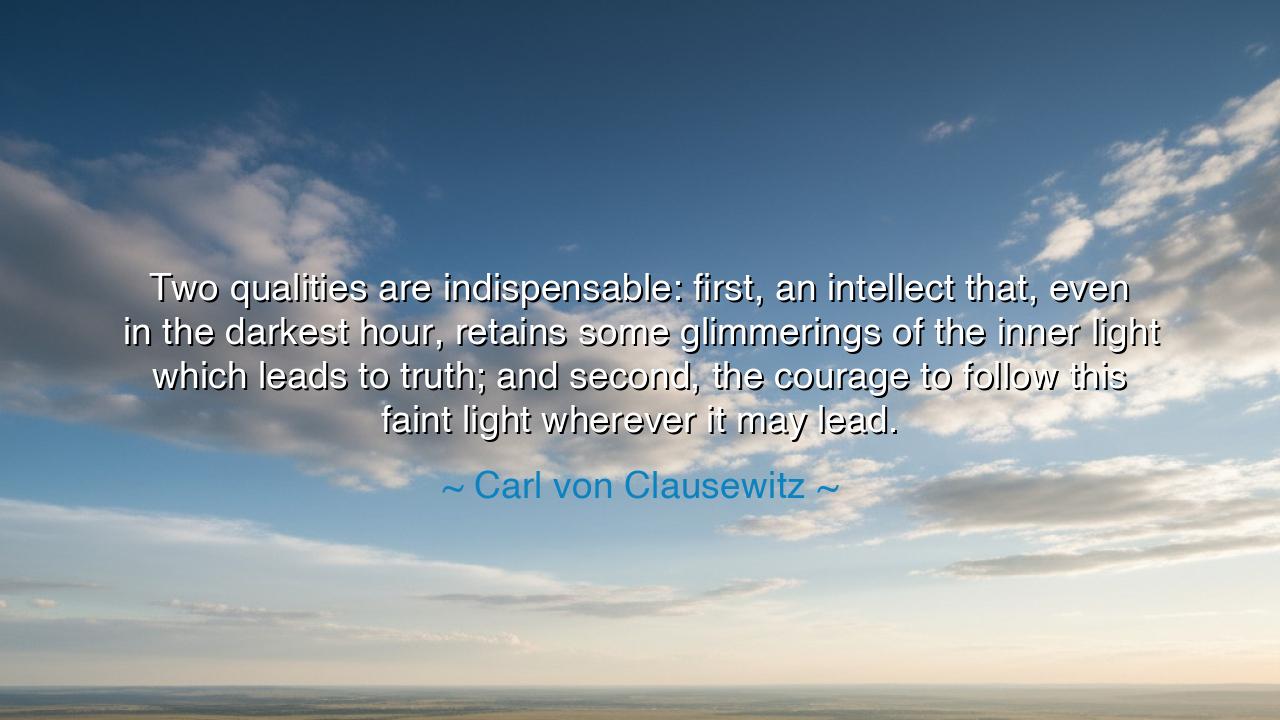
Two qualities are indispensable: first, an intellect that, even
Two qualities are indispensable: first, an intellect that, even in the darkest hour, retains some glimmerings of the inner light which leads to truth; and second, the courage to follow this faint light wherever it may lead.






“Two qualities are indispensable: first, an intellect that, even in the darkest hour, retains some glimmerings of the inner light which leads to truth; and second, the courage to follow this faint light wherever it may lead.” — Thus wrote Carl von Clausewitz, the philosopher of war, whose words reach beyond the battlefield and into the very soul of humanity. His insight is not merely for generals and statesmen, but for all who must walk through the shadows of uncertainty and struggle. For life itself is a campaign of storms and shifting ground, and only those who preserve both intellect and courage — the twin fires of the spirit — can find their way to victory and truth.
Clausewitz, hardened by the smoke of war, knew that the hour of trial reveals the measure of a man. In chaos, when plans crumble and fear clouds reason, it is easy for the mind to surrender to despair. Yet he teaches that one must still keep alive the inner light — the glimmer of understanding that points toward truth even when all around is confusion. This intellect, as he describes it, is not cold calculation, but a disciplined clarity, a steadfast faith that reason and wisdom can still guide the soul through darkness. For the world’s crises — whether in battle, in politics, or in the heart — are not conquered by strength alone, but by insight born of inner calm.
But intellect alone is not enough. The second quality — courage — is what transforms thought into action. Many perceive the light of truth, yet few have the bravery to follow it, especially when it leads against the tide, into danger, or toward the unknown. Courage is the will to trust one’s insight when others call it madness, the resolve to stand firm even when doubt whispers its poison. Clausewitz knew that fear — not ignorance — is often the true enemy of victory. To see the truth is divine; to follow it, human and heroic. The faint light he speaks of demands devotion, for it will not guide the timid or the faint-hearted.
Consider the story of Abraham Lincoln, who lived through one of the darkest hours in human history — the American Civil War. Surrounded by division, bloodshed, and despair, he carried within him that glimmering light of principle: that all men are created equal, and that the Union must endure. He was not free of doubt or sorrow, but he refused to extinguish that fragile flame. And when the light revealed a hard road — the emancipation of slaves and the burdens of leadership — he had the courage to follow it, though it led him through years of anguish and, ultimately, to his own death. Through intellect and courage united, he preserved not only a nation, but the moral conscience of his time.
The origin of Clausewitz’s quote lies in his reflections on the nature of command — on the lonely burden of decision when no guide remains but one’s own judgment. In his masterwork, On War, he described war as “the realm of uncertainty,” a world where chance and fear cloud every path. Yet his lesson transcends warfare: he speaks to all who seek truth amid chaos. The inner light he names is the spark of reason, conscience, and faith that dwells within every human being. It is the wisdom of the heart — fragile, yet indestructible. And the courage to follow it is the discipline of the spirit — the readiness to act upon what one knows to be right, no matter the cost.
These two qualities — intellect and courage — are not merely virtues; they are companions. Intellect without courage is like a lamp that never leaves the tent; courage without intellect is a sword swung in blindness. But together, they form the path of greatness. The wise must think, and the brave must act — yet the noblest soul is the one who can do both in unity, guided by the faint but steady glow of truth. For that glow, though dim in dark times, never deceives. It is the echo of divine reason, the compass of all who walk the uncertain road.
So, my listener of the ages, take this lesson to heart: when your own life falls into confusion, when the night of doubt closes around you, do not despair. Guard your inner light — your clarity, your faith, your reason — as a sacred flame. And when that light shows you even a single step forward, take it. That is your courage. Do not wait for certainty; it may never come. Move instead with conviction born of truth, however faint its glimmer. For the one who preserves intellect in darkness and follows it with courage becomes, in time, the master of both fate and fear.
Thus remember: in every dark hour, the light still lives — and the brave, guided by reason, will always rise to meet it.






AAdministratorAdministrator
Welcome, honored guests. Please leave a comment, we will respond soon